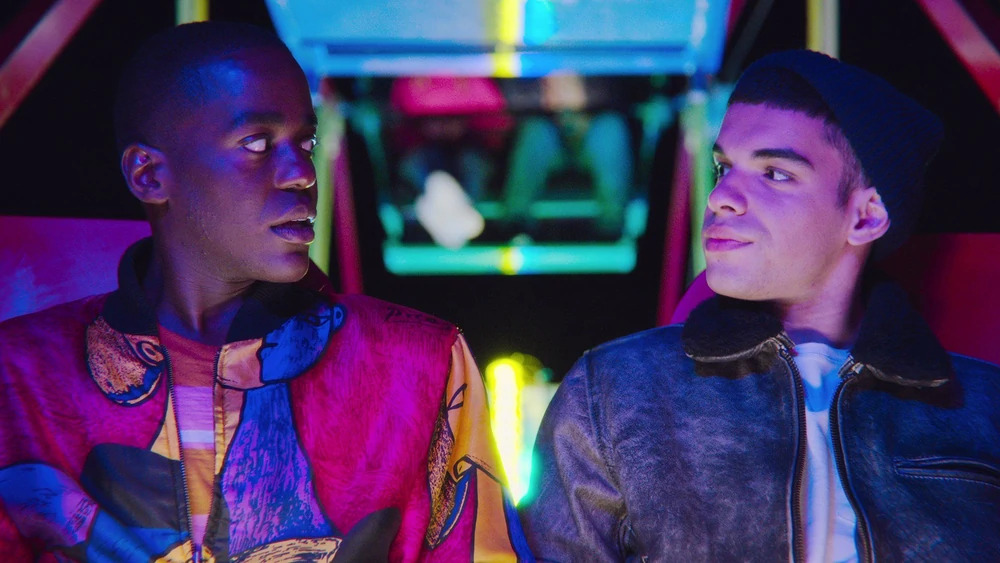
…and how this magnificent series helped me through tough days several times
“But don’t you know I’m out of my mind, so give me a sign
And help to ease the pain inside me.
Baby, love really hurts without you
And it’s breaking my heart,
But what can I do”
Indeed. Love can definitely hurt without you. Jackson Marchetti’s (Kedar Williams-Stirling) interpretation of Billy Ocean’s 1976 soul classic “Love Really Hurts Without You” (which, in spite of having lovesickness on the subject, comes across as pretty lively) is certainly one of the innumerable highlights of “Sex Education”.
The globally loved British Netflix production is a heartwarming, remarkably sensitive and, in many ways, groundbreaking piece of television, albeit in the age of worldwide operating on-demand platforms, television maybe isn’t the perfect choice of words here. Its two so far released seasons (the third one will be released on September 17, 2021) have already helped me through several not so easy days of my life. Here’s how.
(If you haven’t watched „Sex Education“ before, don’t worry. This text is free of major spoilers.)
Delhi, mid-February 2020, when Covid-19 was just a mere and not all too worrying glimmer on the horizon of the international news cycle. Having just landed in India’s capital, this terrifying behemoth of a city (or rather megalopolis), I had some days and nights to kill until an internship, my reason for being there, would kick off.
Even though this was already my third stint in India, I felt a culture shock once again. After all, Indian metropolises are still not less than “major attacks on the human senses”, as I once heard in a documentary on Mumbai, which, just for the record, is the much more glamourous, elegant, and overall, more enjoyable of India’s two premier agglomerations.
This renewed culture shock was reinforced by unexpected low temperatures during nighttime, which in the first evening, even led me to sleeping in my beloved FC Porto polyester jacket. Not exactly the epitome of coziness.
While the nocturnal cold vanished after a day, a feeling of loneliness and being lost in translation lingered longer. Fortunately, this emotional state got wiped away soon. For the most part because of my great flat mate and fellow intern, who quickly became a good friend.
However, during these first days of adaptation I was browsing through Netflix, looking for some distraction to cheer me up. Insert “Sex Education”. Trailer and presentation suggested a facile coming of age series whose delicate eponymous matter would guarantee for some obvious jokes. Whilst my desire for lighthearted comedy got more than fulfilled, “Sex Education” is so much more than your ordinary teen dramedy.
A charming labyrinth of feelings, hormones, and body fluids
While US-American productions of that genre usually come across as pretty puritanical and without much detail on the how, “Sex Education” offers a graphic yet nonetheless refreshingly empathetic portrayal of teenage insecurities centered upon sexuality.
Even though the series presents its subject in a surprisingly plastic way, its charming characters are the opposite of being synthetic. Behind every – now and then silly seeming – dysfunction in the sheets there hides a deeper issue that’s just waiting to be explored.
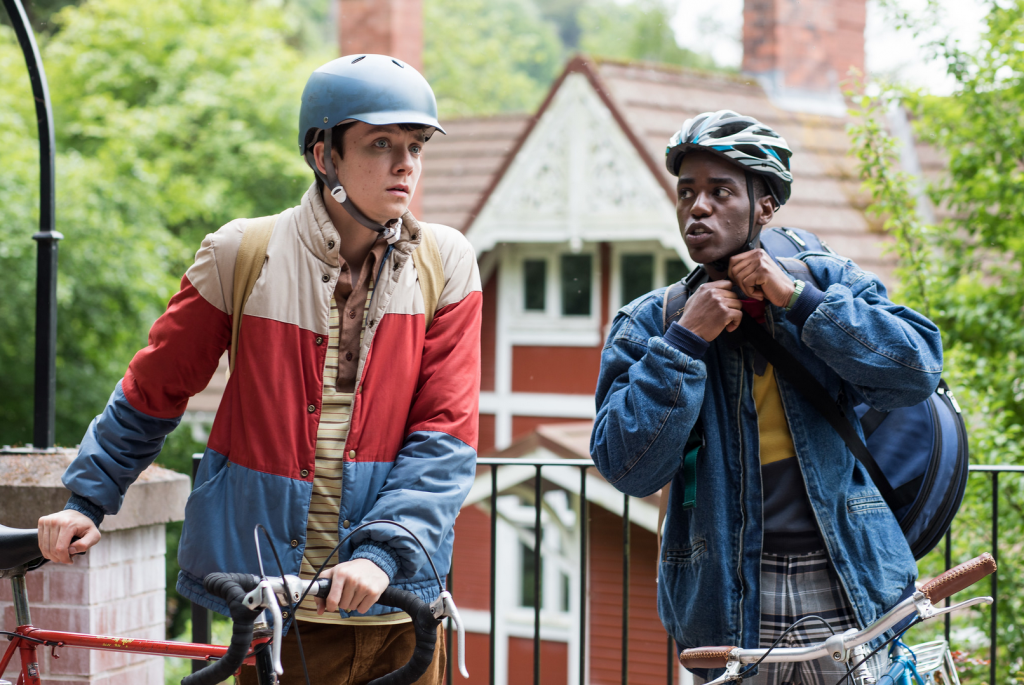
(© Sam Taylor/Netflix)
Through that, sex is rather the medium of psychological struggles, instead of being the core subject of the show. And there are things going on besides sex too, making the Netflix hit also a tale about (unlikely) friendships, family dynamics and human relations in general.
One of the best aspects of “Sex Education” is that the writers’ room around creator Laurie Nunn takes its characters seriously. From the protagonists to the last sidekick, seemingly everyone is portrayed in a nuanced way, which provides a ton of credibility and relatability. Even headmaster Groff (Alistair Petrie, whose facial expressions are pure joy), the role closest to being a caricature, can be witnessed as highly vulnerable in season two.
Several times, I caught myself thinking, “this has to be the best character”, before having the exact same thought about someone entirely different. Furthermore, the pupils at Moordale secondary aren’t really meant to compete for the viewers’ hearts. A much-anticipated gain for one protagonist can equal a heartbreaking loss for one of the other treasured figures.
But the mostly female writing staff (raising the question if women aren’t actually the better or least say more empathetic screenwriters), not only takes their creations seriously, but also their audience. That’s why in this lovely labyrinth of feelings, hormones, and body fluids nobody comes close to being “perfect”. Behind every human facade, no matter how cool or poised, there are abysses and uncertainties.
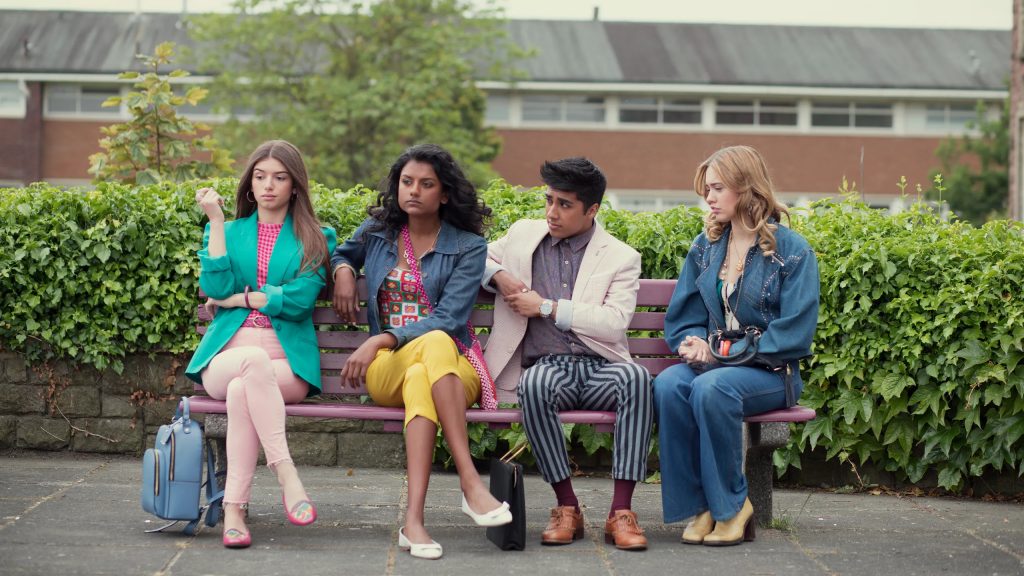
(© Sam Taylor/Netflix)
Therefore, not only the usual suspects – like the school bully and walking crisis of identity Adam (Connor Swindells) or the hilarious “untouchables” – can display highly questionable actions; cherished main characters like Otis (Asa Butterfield), Eric (Ncuti Gatwa, which performance is a revelation) or Maeve (Emma Mackey) sometimes flat out come around as little scumbags on their own.
But their mistakes and failures make them even more relatable. I mean, who doesn’t remember behaving badly, while maybe even having the best intentions, from their own heyday as a teenager?
All these strengths in terms of storytelling, character development and believability enable the show to set up a somewhat odd setting: Otis Milburn is the uptight offspring of the charming single mother sex therapist Jean, played by Gillian Anderson. In spite of being plagued by a sexual dysfunction himself, the 16-year-old teenage boy partners up with the astute maverick Maeve to establish a for-profit sex clinic.
Educational, diverse, and not rarely sociological
By emphasizing the wide range of issues afflicting modern day teenagers, “Sex Education” morphs into an addictive sociological study, which is not shying away from challenging but all the more important topics such as mental health, sexual assault, homophobic violence or parental neglect, while other phenomena of human coexistence such as peer pressure or classism get represented in a more subliminal way.
These themes are illustrated from a perspective that puts the affected figures in the spotlight. Because of this, the show’s progressive imperatives reach the viewership in the best possible way, through the lens of highly relatable human beings, rather than with a raised forefinger.
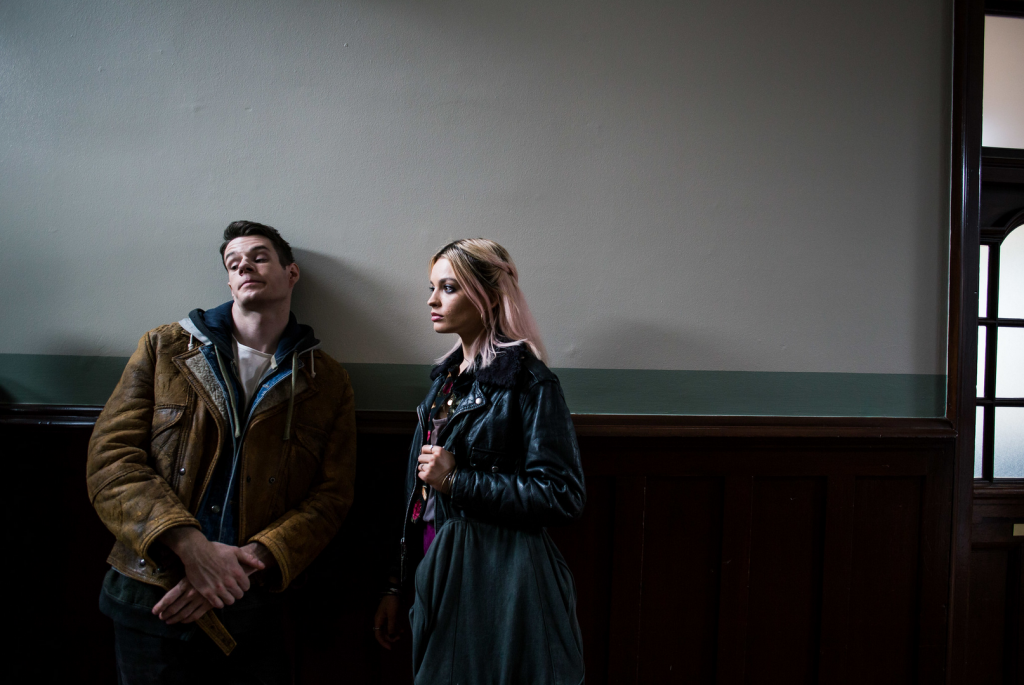
(© Sam Taylor/Netflix)
Since Moordale, the fictional scene of action located somewhere in the UK, functions as a – in certain ways – utopian and retro looking decal of modern Western societies (where teenagers are refreshingly frank about usually shame burdened matters), particular social issues which usually don’t get this much screen time, if any, can be explored.
This might be an explanation why racism doesn’t seem to exist at all in the picturesque small town. This circumstance leads to the PoC characters (People of Color) being defined by anything other than their skin color. But that shouldn’t be regarded as criticism as PoC obviously have to deal with all the different issues of becoming adult too. Keyword intersectionality.
The disregard of skin color, however, doesn’t stop the show from exploiting themes of cultural belonging and identity. Take for example the church scene and the following conversation about religion between Eric and Rahim (Sami Outalbali) or the little Iranian Indian dust-up, both happening in season two. And not to forget Eric’s sparkling and already iconic West African appearance at the end of the first season.
A much-needed help to ease the pain inside me
But back to myself and to the beginning of this text (remember: “love really hurts without you”). Like Otis and later swimming pool starlet Jackson, in spring 2021 I had to deal with severe lovesickness that in some way still haunts me (but that’s a whole different story, I guess).
Hence, I was once again desperately searching for something to brighten my mood, albeit for much more painful reasons compared to when I first encountered “Sex Education”.
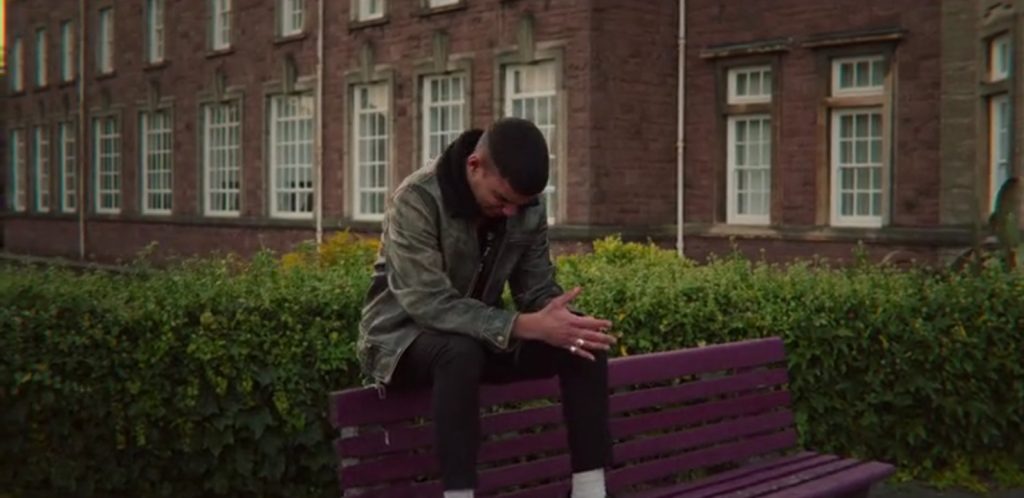
(© Netflix)
As it was more than a year ago since I first feasted my eyes on the show and my memory of some of the storylines was sort of sketchy, I thought why not give it another run. After all, I vividly remembered how much I was in awe during my first time watching it and how genuinely I cared about the ensemble. Although the series obviously could not resolve the cause of my sorrow, it actually did help to ease the pain inside me, as Billy Ocean would put it.
Even after rewatching it several times (I actually first rewatched it in German, and then watched it for a third time in order to improve my British youth slang), the series did not lose its captivating grip consisting of mesmerizing visual aesthetics (e.g., check out this beautiful scene), shrewd situational comedy and a thoroughly convincing cast, amongst other things. Not to forget the entrancing soundtrack.
Of course, there is also reason for criticism, although this is lamenting in luxury. Take for example, the cause of the main characters’ sexual dysfunction, which is not all too convincing, or the early abortion, which is almost treated like your everyday medical intervention. One could also argue that the depiction of one of the main relationship developments in season two is far from being innovative, if not even dangerous.
“But we can always control being truthful”
Still, there’s just so much to learn from the adolescents of Moordale, making the Netflix sensation an educational and thought-provoking piece of entertainment for every adult age group. As Lucy Mangan perfectly phrased it in her season two review for the Guardian: “’Sex Education’ sets so many conventions cheerily but firmly aside that you feel like an entire forest of received wisdom is being clear-cut”.
One of the many powerful messages that stuck most with me is that in case of doubt, being honest is always the best thing to do, even if it doesn’t pay out immediately or at all. As main character and underground school sex therapist Otis advised, “we all have flaws and our bodies do things we have no control over. But we can always control being truthful.”
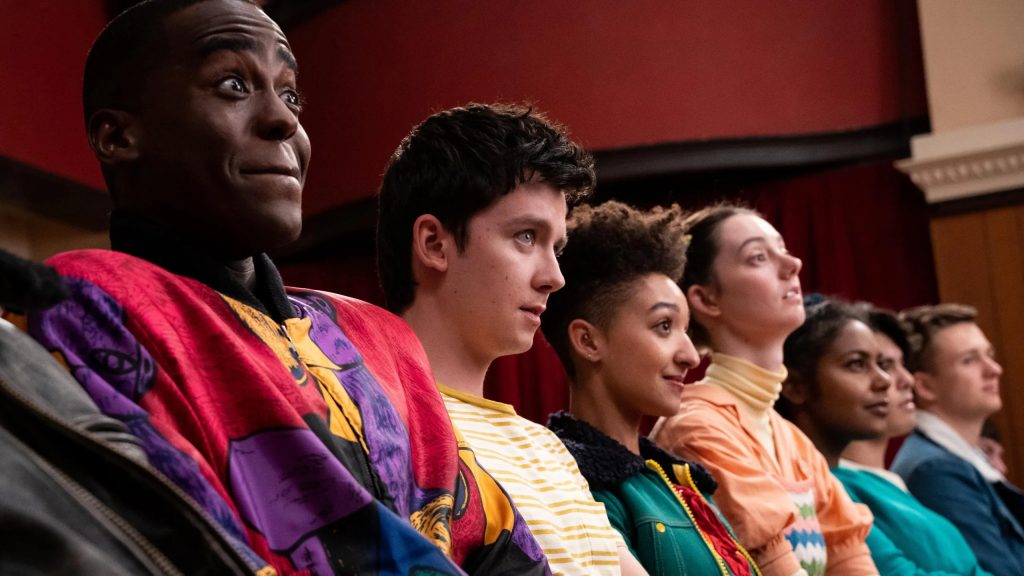
That should also include being truthful about one’s own feelings as life is too short and precious to hide them, especially the positive ones towards other humans (a theme that is dealt with in several story arcs). Hence, showing ourselves as vulnerable shouldn’t be regarded as a sign of weakness but instead as one of sheer strength.
By surmounting shame and being unafraid to tackle sexuality in a concrete but trailblazing earnest way, “Sex Education” shows that it’s possible to address all the various hiccups of reaching adulthood and beyond in an authentic manner.
Probably every one of us can learn a slice or two of this unusually presented sagacity. On top of that, the sixteen so far released 50-minute episodes are great fun and come as close as it gets to being “must watch”. If the brilliant series can help me in burdensome times, it will almost certainly also bring a smile to your heart and soul. So, don’t hesitate and give it a try.
(If you enjoyed the text please leave a like!)
